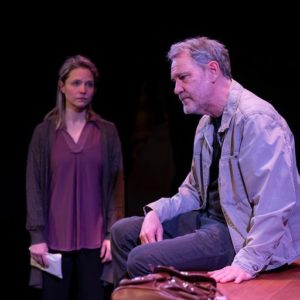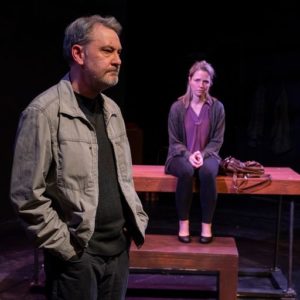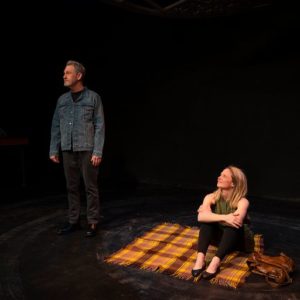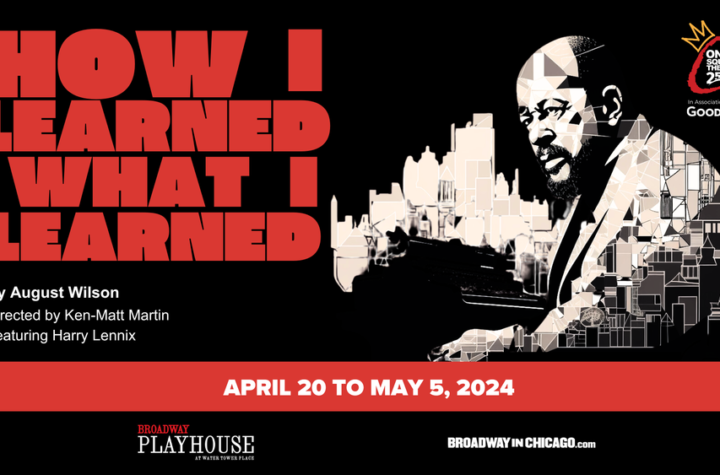
 [rating=1]Great acting cannot save a chaotic and confused story in Griffin Theatre Company’s “Heisenberg: The Uncertainty Principle.” A choppy script combined with too many inappropriate f-bombs and needless hysterics make the show memorable for all the wrong reasons. To say that this production falls short is an understatement.
[rating=1]Great acting cannot save a chaotic and confused story in Griffin Theatre Company’s “Heisenberg: The Uncertainty Principle.” A choppy script combined with too many inappropriate f-bombs and needless hysterics make the show memorable for all the wrong reasons. To say that this production falls short is an understatement.
Georgie (Laura Coover) is a 40-something-year-old chatterbox from New Jersey, who meets native Britisher Alex Priest (Scott Anderson) on a park bench in London, England. Starting with a kiss on the back of his neck, she engages the 75-year-old during their chance encounter. Not only does she talk about herself and her troubles incessantly, but peppers her harangue with incessant profanity—to the point of being ridiculous. Alex, in comparison, is a polite man of few words. Because he happens to drop his name in the course of their conversation, she looks him up on Google—and the next thing you know, she arrives at the butcher shop he owns, only to stalk him. Initially put off by Georgie, Alex later becomes intrigued with her and her story. It seems that Georgie has a 19-year-old son named Jason, whom she has lost touch with. Alex too has had his share of losses: the most important one being abandoned by a girlfriend named Joanne. Thus Georgie and Alex are more closely drawn together as a couple despite their age differences due to their common emotional pain.
We only learn later why Georgie is intrigued by Alex: she clearly wants to take advantage of him. It turns out that their accidental meetup was a ruse from the very beginning: She had the man staked out, looking for some Sugar Daddy who seemed old and vulnerable, who might gift her £15,000 so that she might return to the United States and find her missing son. Since Georgie admits throughout the entire story that she is always lying and playing games with the truth, this puts her entire narrative into doubt. At first, Georgie says she’s from Islington and then Acton (both areas of London). Then after she puts on some kind of inauthentic British accent, she slips into an American one (which initially seems all the more bizarre). She says she’s a waitress and then a receptionist; she says she once travelled to Thailand and later that she has made it all up: Alex never knows when or whether to believe what Georgie says—and that’s when the audience gets lost regarding the storyline and when we begin to lose interest in the characters.
While Alex is more credible than Georgie and the more likeable of the two, neither is truly engaging or interesting enough to base an entire play upon. We never learn why Georgie was in London in the first place. And as time wears on, we doubt whether Jason actually exists, and if he does, whether Georgie really wants to find him or whether he’s even findable. But despite Georgie’s obvious deceit and Alex’s recognition of it, he falls for her anyway and gives her all the money she wants, plus he follows her back to New Jersey. I was turned off from Georgie from practically the beginning of the show, but Alex’s string of bad decisions made me less caring about his fate too. Clearly, the man knows he is being taken advantage of but is more than willing to be conned. I do know that loneliness can and does often make people act irrationally; however, I might have been more sympathetic to Alex’s situation had he shown signs of dementia or some ailment that might have clouded his judgment. That said, as the story got more convoluted, illogical, and scattered, I became less interested in what might happen to the characters.
I kept trying to make sense out of trivial dialogue that was not supposed to make sense. Are these people’s lives so miserable that having sex is the only thing that can keep them together? This was supposed to be a love story; then it seemed like a giant swindle; then the moment the audience would follow one thread, something else would pop up and a previous thread would break. I was especially offended by Georgie making all sorts of weird excuses to keep Alex’s money and later by her saying to him that eventually he was bound to croak. I finally concluded that I was working much too hard to make sense of a script that needs a complete rewrite with a clearer focus.
There are a few redeeming qualities to the performance, however. The directing by Nate Cohen is good, because there is fluid movement across the stage throughout. I particularly liked the onstage costume changes that demarcated one scene from the next. Speaking of costumes, those created by Rachael Sypniewski are appropriate and well-crafted. The inventive uses of furniture and props on a mostly black-box stage is nicely done by properties designer Paloma Locsin. It was great to see how the actors moved these large props around in interesting ways so as to configure counters at a butcher shop, a large bed, and other appurtenances which they interacted with. Thanks to the efforts of scenic and lighting designer Garrett Bell, the angel wings sculpture on the ceiling is notable; we observe how it is lit differently from scene to scene. Plus L.J. Luthringer has done a fine job with the sound design.
Then there is the issue I have with the title of the show. The story has nothing at all to do with the Uncertainty Principle, developed by Nobel laureate Werner Heisenberg in 1927. This is the theory of quantum mechanics where “we cannot know both the position and speed of a particle, such as a photon or electron, with perfect accuracy; the more we nail down the particle’s position, the less we know about its speed and vice versa.”* Given that the title is factually inaccurate, if not misleading, it appears to be a nod to the seeming randomness of people and objects throughout the universe, combined with never knowing where we are going to be at any given moment in time. So it is particularly weird when Georgie refers to this principle in discussing her strained relationship with her son Jason (assuming that he ever existed at all). The phrase might have been more apt to describe the happenstance of approaching Alex on the park bench, but so it goes.
About fifteen minutes into the show, I did something I haven’t done in many, many years: I fell asleep with my eyes open. Yes, it really can happen, and it lasted but a minute or so—and I was fully cognizant of the whole experience afterwards! I wasn’t tired, and I wasn’t daydreaming either. Rather, I was having an actual dream as if I were asleep in bed but with my eyes wide open while looking directly at the stage. At first, I questioned myself: Why wasn’t I fully engaged in this story, such that I drifted off onto another plane of existence? Then it came to me: This is the true Heisenberg Uncertainty Principle! Watching the show produced within me a meditative state where my consciousness was suddenly in two places at once, uncertain of my standing in the universe.
Let me end with a brief quotation of what my guest thought of the performance: “When I got home, I looked at the title of the play… and decided that one word was quite appropriate and that was ‘uncertainty’ because I’ll be never really certain what the play was about or supposed to portray. Both actors are extremely talented, and I felt that the play was haphazardly thrown together like a bunch of puzzle pieces that never match up and fit.”
“Heisenberg: The Uncertainty Principle” is playing through March 26, 2023 at Raven Theatre, 6157 N. Clark Street, Chicago.
 Tickets: $40.
Tickets: $40.
Students/active military and veterans: $15.
Group discounts are available for groups of ten or more.
Performance schedule:
Thursdays, Fridays, and Saturdays at 7:30 p.m.
Sundays at 3:00 p.m.
For more information about the show and to purchase tickets, see https://www.raventheatre.com/stage/heisenberg/ or https://griffintheatre.com/heisenberg-the-uncertainty-principle/ or call 773-338-2177.
For more information about the Griffin Theatre Company, go to https://griffintheatre.com/.
To learn about other offerings at Raven Theatre and for general information about the venue, visit https://www.raventheatre.com/.
COVID-19 safety: Raven Theatre will require patrons to wear a face mask at all times inside the building (when not eating or drinking in the lobby). The theatre will no longer require patrons to provide proof of vaccination to attend a production. If you are experiencing symptoms of COVID-19, please contact the box office to reschedule your tickets free of charge. For all of Raven’s current COVID-19 protocols, visit https://www.raventheatre.com/covid-19.
*This quotation about the meaning of the Heisenberg Uncertainty Principle is taken from the Caltech Science Exchange Project. See: https://scienceexchange.caltech.edu/topics/quantum-science-explained/uncertainty-principle.
To see what others are saying, visit www.theatreinchicago.com, go to Review Round-Up and click at “Heisenberg: The Uncertainty Principle”.






More Stories
“Barefoot in the Park”
“Joe Turner’s Come and Gone”
“How I Learned What I Learned” reviewed by Julia W. Rath